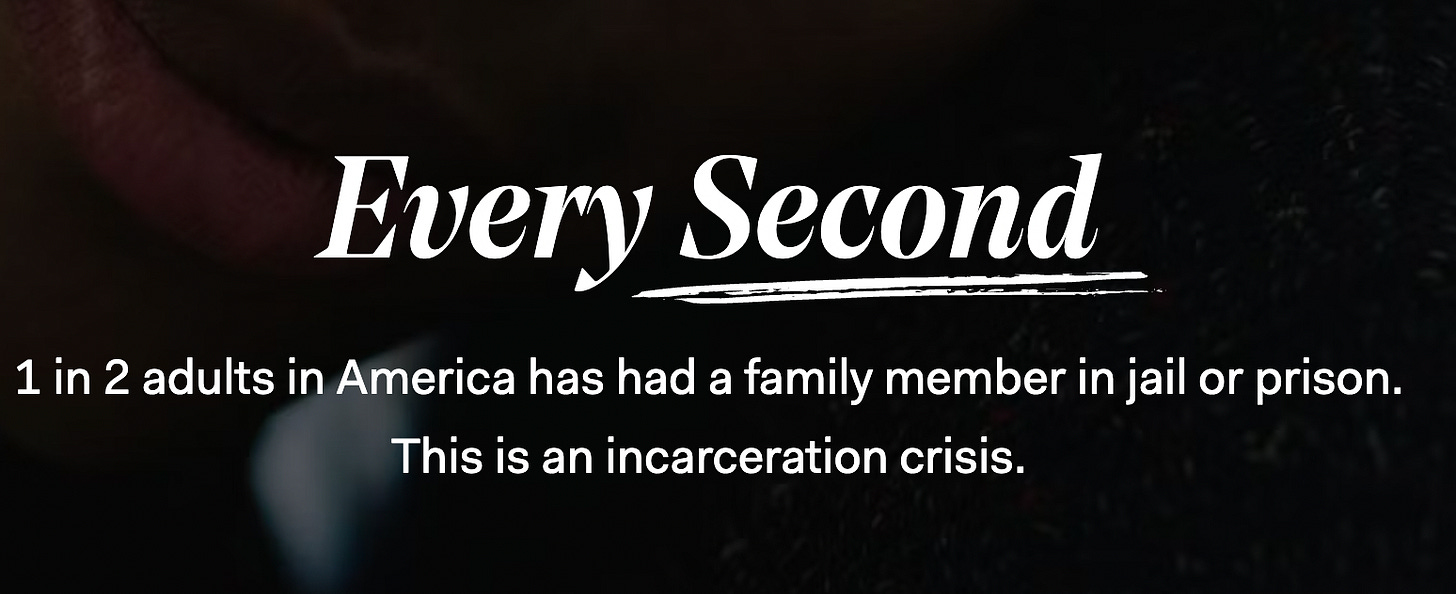Election Edition #4
The end is nigh!
Hello! Here we are right now, after a media training we just did for the very cool office of the Federal Defender in Atlanta. Let us know if you want one for your office! Also, we did plan to match, if you’re wondering.
OK — we’re back with another election-focused edition of The Jump Line. Less than two weeks until the big day. Don’t you just wish election season could go on forever?
Our interview today is with FWD.us’s Executive Director Zoë Towns, who is an expert in many things, chief among them polling and public sentiment around the criminal legal system. Much of what she told us upends traditional political narratives about what voters want when they’re concerned about crime and violence (spoiler alert: it’s not more policing and incarceration).
Perhaps this shouldn’t be a surprise. Our national experiment with incarcerating more of our residents than any other country on Earth has touched almost everyone in one way or another. Most people know someone who has been incarcerated, whether that’s a family member or friend or colleague or neighbor. The advent of smartphones and social media has allowed footage of police violence and killings to seep into the mainstream. Really excellent journalism – like Jennifer Gonnerman’s piece on Kaleif Browder and Wesley Lowery’s Fatal Force project – has fundamentally changed how people think about these systems.
There are so many threads here for journalists to follow in their conversations with voters and in their coverage of the criminal legal system more broadly. We’re excited to see where these threads lead you.
Q: In our last newsletter, we heard that large sectors of the public still believe that crime is on the rise (even though crime rates have declined sharply). How do you square those concerns with the polling we also see - including from your organization - demonstrating support for criminal justice reforms?
A: You simply can’t understand public opinion on crime, safety, and justice independent from one of the largest American public policy backdrops of the last forty years: mass incarceration. Voters across the political spectrum have been overexposed to the harms of mass incarceration. An astounding one in two Americans have experienced incarceration in their immediate families, for example. It's that personal and community experience coupled with the now very large canon of evidence about the problems in our criminal legal system, including its low public safety returns, that have opened up reform appetites in red, blue, and purple jurisdictions.
Too many pundits continue to frame these issues in the false choices of yore - Do voters care about justice or has the proverbial public opinion pendulum swung back towards safety? - in ways that just totally misunderstand the history voters have lived through, the realities they are currently experiencing, and the sophistication they’ve developed as a result. A recent poll our team at FWD.us conducted with BSG found that 2 in 3 likely voters believe that mass incarceration contributes to problems that lead to unsafe communities like homelessness, drug and mental health challenges, and poverty, as opposed to only 1 in 14 who believe that locking more people up alleviates those social problems. We also found that 72% of likely voters believe it’s important to reduce the jail and prison population in the United States. That share is even higher for Black (80%) and Latino (74%) voters, who are disproportionately impacted by (and therefore more informed about) both crime and incarceration.
Voters are appreciating what research has long held to be true: that they can and should have safety and justice at the same time. While there will always be opportunistic politicians looking to scare voters to the ballot box, by and large, criminal justice reform maintains a majority and bipartisan backing unusual in today's hyper partisan politics.
Q: We’ve read and heard a lot about voter’s concerns about crime, but we haven’t come across as much coverage of the public safety policies that voters support. What have you found in your polling?
A: Recent polling from the ACLU shows what voters want in place of the punitive policies they’re ready to jettison. Here are three proposals that voters believe would be more effective at improving safety than hiring 100,000 more police or increasing prison and jail sentences: 1) increasing access to mental health care, 2) addressing poverty, economic despair, and lack of opportunities, and 3) sending behavioral health workers to issues related to mental health, homelessness, and substance use.
In our own polling, we found strong support for a wide variety of criminal justice reform policies proven to safely reduce incarceration. More than three-quarters of voters support second look policies (which allow judges and prosecutors to review cases after a person has served at least 10 years in prison and reduce the sentence on a case-by-case basis), earned time (which increases the amount of time that people can earn off their prison sentence for following prison rules and participating in rehabilitation programs), and reducing pretrial detention (by ending the practice of keeping people in jail before their trial if they have been charged with a nonviolent offense).
Experience has taught voters what decades of research have proven: mass incarceration is among the most expensive and least effective ways to advance public safety. In fact, incarceration often increases the likelihood that people will return to jail or prison, as well as generating a whole host of harmful consequences for families and communities, particularly Black communities. Meanwhile, investments that strengthen the social fabric and community-led interventions are paying dividends. Expanding Medicaid reduced arrests by 20-32%. Cleaning up vacant lots in Philadelphia reduced gun violence by nearly 30%. Providing supportive housing for people with frequent police contact in Denver reduced arrests by 40%. Providing subsidized job experiences and mental health support to men involved in gun violence in Chicago reduced arrests for shootings and homicide by 65%. And so much more. We’ve been trained to think of these kinds of approaches as tangential to public safety and “nice to have” investments rather than as serious, necessary, and life-saving public safety priorities.
Q: Do you have a sense of whether these policy opinions drive voting behavior?
A: Listen, we have all seen overwhelming evidence that shows voters are headed to the polls this fall with their pocketbooks and household budgets at the forefront of their minds. I am not here to convince you that criminal justice reform is a top 5 issue in this presidential election (though I will note that mass incarceration is, in fact, a very real driver of American poverty and an acute aggravator of the affordability crisis). But what I do really want to stress is that criminal justice reform is a meaningful motivator for many voting groups and, importantly and contrary to lots of the punditry, it’s a low risk proposition. Just 1 in 10 voters say that a candidate's support for criminal justice reform would make them less likely to vote for that candidate. Five in 10 voters would be more likely to back a candidate who supports criminal justice reform and that number leaps to 7 in 10 for Black male voters. These numbers fly in the face of most conventional wisdom about voting behavior on these issues and offer journalists the opportunity to ask voters a different set of questions in the lead up to this and future elections.
Q: Is there anything else you think journalists covering crime during this election season should know?
A: My organization, FWD.us, also works to advance long overdue reforms to our immigration system, and I’d be remiss not to acknowledge the inaccurate–and frankly dangerous–claims made about immigrants during this election cycle, given that many of those claims center on crime, the subject of this newsletter. I’ll start with the basics: immigrants are not causing crime to increase in this country. First, crime is declining and, second, immigrants and immigration are actually tied to safer communities. Numerous studies show that immigrants–including people who are undocumented–are less likely to commit crimes and to be incarcerated. Journalists covering the election have the opportunity, and the responsibility, to be clear about this extensively researched fact.
—
A little bit more before we go:
The use of AI in policing continues to be really dangerous. This excellent Washington Post investigation by Douglas MacMillan, David Ovalle and Aaron Schaffer dives into the phenomenon of facial recognition technology (which is notoriously bad at accurately identifying anyone except white men) being used as grounds to arrest people, sometimes for crimes they didn’t commit. Their investigation also found that police conceal their use of the facial recognition technology, saying, not entirely honestly, that they come to these arrests through “investigative” means.
And since we’re on the scary-AI x criminal legal system theme, here’s another good one from Todd Feathers at Wired: Cybercheck, a Canadian AI company claims to “geolocate” people by tracking interactions with wireless networks – but Wired’s own investigation found that the technology is unreliable (shocker), often offering inaccurate or unverifiable evidence.




https://open.substack.com/pub/billionairbear/p/trump-on-joe-rogan?r=1g5bw0&utm_medium=ios